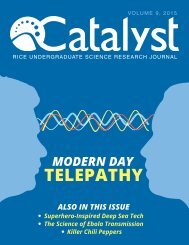You also want an ePaper? Increase the reach of your titles
YUMPU automatically turns print PDFs into web optimized ePapers that Google loves.
MEDICAL MARIJUANA? MORE LIKE
MEDICAL MDMA
PARTY DRUGS AND PTSD
Aruni areti & jackson savage
Abstract
Post traumatic stress disorder, or
PTSD has a long history of treatment
through supportive medications such
as benzodiazepines and serotonin
reuptake inhibitors, both treatments
often yielding temporary results and
lacking long-term solutions. Exposure
therapy, a novel treatment process
including administering microdoses of
MDMA, has recently surged in popularity
in reducing PTSD symptoms long-term.
The purpose of this article is to identify
how MDMA can treat persistent PTSD
symptoms through its ability to provide
patients with heightened openness and
decreased Neuroticism. The review also
covers how MDMA-assisted psychotherapy
patients exhibit an increase in openness
and a decrease in Neuroticism, which
demonstrates an improvement of PTSD
symptoms and causes long-term changes
in personality structure. A landmark study
investigates these symptoms through
a randomized trial of MDMA-assisted
psychotherapy therapy. 1 Symptoms such
as Neuroticism and personality variation
improve due to responses found within
3,4-MDMA-assisted psychotherapy. An
additional study illustrates the long-term
effects of MDMA-assisted psychotherapy
by encompassing a multi-month trial
monitoring 19 subjects with a longterm
follow-up. 3 The study illustrates
that subjects, on average, maintained
statistical and clinical gains in symptom
relief from MDMA-assisted psychotherapy,
as opposed to results from previously
existing treatments. The MDMA,
administered in a therapeutic setting,
provides a balance of stable emotions
including a sense of safety and control,
allowing for more mental stability in
patients diagnosed with PTSD.
Introduction
PTSD, is related to both trauma and
stress, which share common effects
with anxiety and dissociative-disorders.
Symptoms stem from the introduction of
a traumatic event, often linked to serious
injury or the death of a significant other.
Manifestations of the disorder include
severe psychological distress and recurring
dreams or flashbacks depicting the
traumatic event. These reminders of the
event negatively affect mood, cognition,
and reactivity of those affected. Global
likelihood to experiencing a traumatic
event is estimated to be around 50-90% 2 ,
and estimated lifetime risk ranges from
6-10%, with women twice as likely to
develop PTSD as men. 3
Psychotherapy is recognised as the most
effective form of treatment for PTSD.
Within psychotherapy, there are several
treatments that have been successful,
including Cognitive Behavior Therapy
(CBT), Cognitive Processing Therapy (CPT),
Trauma-Focused Cognitive-Behavioral
Therapy (TF CBT), and Eye Movement
Desensitization and Reprocessing (EMDR).
Limited research has been conducted to
track personality changes associated with
PTSD treatment response, as personality
theorists argue that traits are relatively
stable during adulthood. There is
evidence, however, linking PTSD to certain
changes in personality after exposure to
trauma. As an example, Vietnam veterans
demonstrated high Neuroticism scores on
the NEO Personality Inventory (NEO PI). 3
Recently, ±3, 4-
methylenedioxymethamphetamine
(MDMA) has been coupled with
psychotherapy in clinical trials to enhance
therapeutic changes in patients. Initial
results have been promising, highlighting
significant reductions in PTSD symptoms
as well as increased longevity of treatment
effects. Evidence suggests that MDMA
increases prosocial feelings and behaviors,
which directly reduce negative moods and
fear response. For these reasons, MDMA
is considered therapeutic as it induces
increased empathy and affiliation due
to serotonin release, with effects lasting
3-6 hours3. It is important to distinguish
between the controlled use of MDMA and
the commonly abused ‘ecstasy,’ which
has unknown purity and dosage. In a
controlled setting, MDMA has the scope to
provide relief to PTSD victims by providing
them with a sense of safety and control. 4
Methods
The first methods section investigates
purported mechanisms of psychological
change coupled with previously obtained
data on MDMA-assisted psychotherapy.
There is a focus on tracking the
Neuroticism and openness variables of
the Neuroticism, Extraversion, Openness
Personality Inventory-Revised test (NEO
PI-R). Screening consisted of a Structured
Clinical Interview for Axis I Diagnosis
(SCID) module, which identifies borderline
personality disorder, and a Clinician-
Administered PTSD Scale (CAPS) with
at least 50 subjects having treatmentresistant
symptoms from war-related
events. Additionally, subjects that had
CAPS score of greater than 50 (moderate
to severe PTSD symptoms) were
administered serotonin-norepinephrine
reuptake inhibitor (SNRI) and provided
with 6 months of psychotherapy. 3 All
subjects suffering from major medical
conditions, other psychiatric conditions,
substance abuse (screened through a
urine test), or major depression were
excluded. Twenty subjects, entirely
32 | CATALYST


![[Catalyst 2019]](https://documents.yumpu.com/000/063/794/452/bc6f5d9e58a52d450a33a2d11dbd6c2034aa64ef/565a4e385270724c6a7173644b3048396347312f6a673d3d/6c3343624f7278694e56504e44336b773074784847513d3d.jpg?AWSAccessKeyId=AKIAICNEWSPSEKTJ5M3Q&Expires=1715169600&Signature=aMpoejBKjkfPbq2BDFgRCjRgbe8%3D)

![[Rice Catalyst Issue 14]](https://img.yumpu.com/68409376/1/190x245/rice-catalyst-issue-14.jpg?quality=85)
![[Catalyst Eureka Issue 2 2018]](https://img.yumpu.com/62125575/1/190x245/catalyst-eureka-issue-2-2018.jpg?quality=85)
![[Catalyst 2018]](https://img.yumpu.com/62125546/1/190x245/catalyst-2018.jpg?quality=85)
![[Catalyst Eureka Issue 1 2017]](https://img.yumpu.com/58449281/1/190x245/catalyst-eureka-issue-1-2017.jpg?quality=85)
![[Catalyst 2017]](https://img.yumpu.com/58449275/1/190x245/catalyst-2017.jpg?quality=85)
![[Catalyst 2016] Final](https://img.yumpu.com/55418546/1/190x245/catalyst-2016-final.jpg?quality=85)
